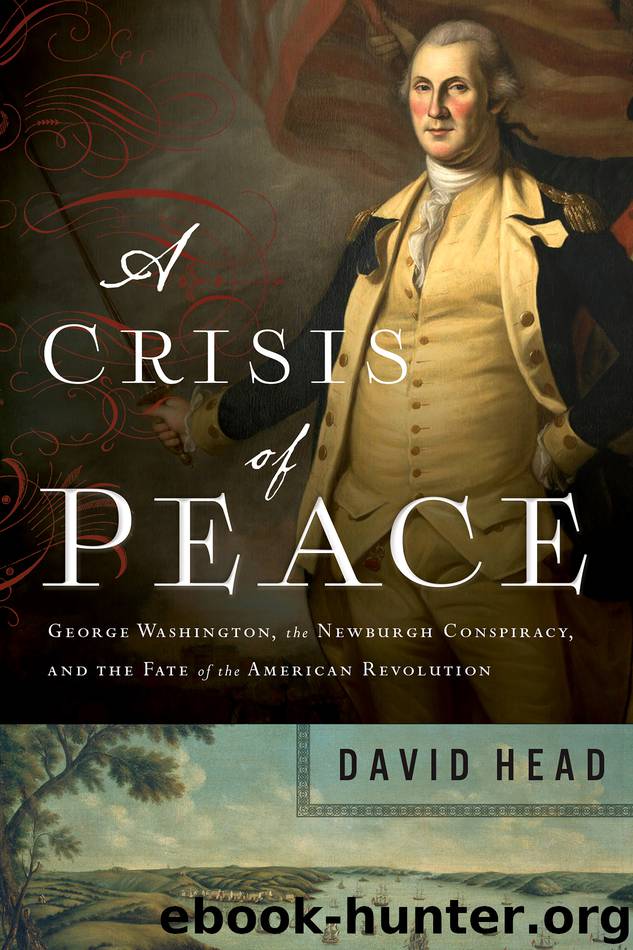A Crisis of Peace by David Head

Author:David Head
Language: eng
Format: epub
Publisher: Pegasus Books
Published: 2019-09-29T16:00:00+00:00
While Washington was writing to Boudinot, Jones, and Hamilton, he received more unpleasant news. A new anonymous publication had appeared in camp, demonstrating that Monday’s letter could not have come from Philadelphia. However much it might disturb Washington, an officer was the author, there was no doubt about it now.33
The new anonymous letter also issued from the pen of John Armstrong, Jr. It was a response to criticism of the first letter and a response to Washington’s general orders. Armstrong proclaimed himself proud of his earlier work. He said aloud what other, more timid officers only thought or grumbled about under their breath. Armstrong praised distrust of Congress as a virtue. “Suspicion,” he wrote, “is the loveliest trait of political Characters.” General Washington’s suppression of the meeting was not what it seemed, Armstrong continued. In fact, the general postponing the meeting showed that he approved the idea of the officers gathering to write a stern letter to Congress. If not, why didn’t he simply cancel the meeting outright? Finally, Armstrong swatted away criticism of his anonymity. Putting his name to the letter wouldn’t change the argument, or alter the officers’ situation, or recommend against gathering as proposed.34
Armstrong’s testiness suggests the officers greeted his first letter with something less than the universal applause he desired. The only extended record of the officers’ reaction to the March 10 letter corroborates that impression. Written by Lieutenant Colonel Benjamin Walker, an aide to Washington, the account excoriated Armstrong. Though the anonymous letter was “extremely well written,” Walker said, it was pernicious, “perfectly calculated to inflame the passions & prepare the Minds of the Officers for any Violent measures which might be recommended to them.” Walker zeroed in on one aspect of Armstrong’s plea: the threat to refuse to disband in peace or abandon their post if war continued. He had no ears to hear Armstrong’s more moderate request for a new, strongly worded letter to Congress.35
According to Walker, only a minority shared Armstrong’s view; the most respected officers deplored it. Like Washington, Walker suspected someone in Philadelphia wrote the letter and sent it to the Highlands as part of a scheme for the officers to come out in league with the public creditors. Walker scorned collaboration. “The army will not be their tools nor will they Join with any body of Men however numerous.” They would not sacrifice their reputations. Although some officers doubted Congress, Walker admitted, they trusted their states to make them whole. Everyone rejected threats. Only after a peace and only after exhausting both Congressional and the state remedies would the officers consider retiring “like a band of Brothers into the Wilderness.” All would end well, Walker finished. “A few whose feelings actuate them more than their Reason—would sacrifice everything to their Resentment but it is a small party who think thus.” Come noon on March 15, he predicted, the majority would prevail.36
Other officers weren’t so sure.
General Knox feared what the army might do. “Officers expectations are at an end,” he moaned to McDougall.
Download
This site does not store any files on its server. We only index and link to content provided by other sites. Please contact the content providers to delete copyright contents if any and email us, we'll remove relevant links or contents immediately.
| Africa | Americas |
| Arctic & Antarctica | Asia |
| Australia & Oceania | Europe |
| Middle East | Russia |
| United States | World |
| Ancient Civilizations | Military |
| Historical Study & Educational Resources |
Washington by Ron Chernow(818)
Patriot Pirates by Robert H. Patton(739)
James Madison: A Life Reconsidered by Lynne Cheney(728)
American Tempest by Harlow Giles Unger(712)
John Adams by David McCullough(683)
The Radicalism of the American Revolution by Gordon S. Wood(655)
George Washington's Secret Six by Brian Kilmeade(634)
Mary Ball Washington by Craig Shirley(631)
The Whites of Their Eyes by Jill Lepore(579)
Henry Knox: Visionary General of the American Revolution by Mark Puls(562)
To Begin the World Over Again by Matthew Lockwood(552)
American Revolution For Dummies by Steve Wiegand(551)
A Wilderness So Immense by Jon Kukla(548)
The First Conspiracy: The Secret Plot to Kill George Washington by Brad Meltzer & Josh Mensch(542)
The American Revolution: A History by Gordon S. Wood(539)
Poor Richard's Almanack by Benjamin Franklin(538)
Revolutionary Summer: The Birth of American Independence by Joseph J. Ellis(528)
The Federalist papers by Alexander Hamilton; James Madison; John Jay; Lawrence Goldman(500)
Paine, Thomas - Complete Works of Thomas Paine by Paine Thomas(497)
